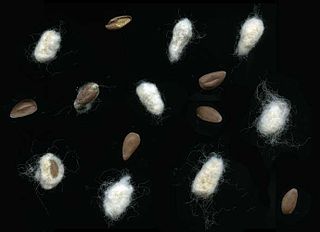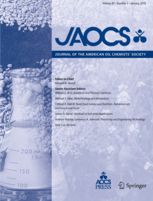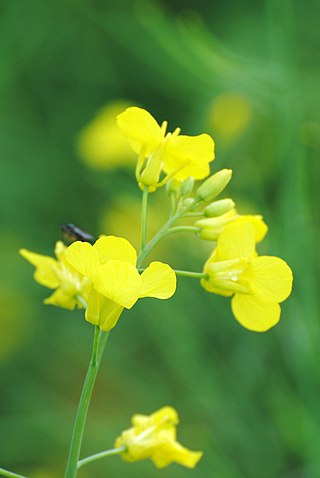
Vegetable oils, or vegetable fats, are oils extracted from seeds or from other parts of fruits. Like animal fats, vegetable fats are mixtures of triglycerides. Soybean oil, grape seed oil, and cocoa butter are examples of seed oils, or fats from seeds. Olive oil, palm oil, and rice bran oil are examples of fats from other parts of fruits. In common usage, vegetable oil may refer exclusively to vegetable fats which are liquid at room temperature. Vegetable oils are usually edible.

Cottonseed oil is cooking oil from the seeds of cotton plants of various species, mainly Gossypium hirsutum and Gossypium herbaceum, that are grown for cotton fiber, animal feed, and oil.

Saponification value or saponification number represents the number of milligrams of potassium hydroxide (KOH) or sodium hydroxide (NaOH) required to saponify one gram of fat under the conditions specified. It is a measure of the average molecular weight of all the fatty acids present in the sample in form of triglycerides. The higher the saponification value, the lower the fatty acids average length, the lighter the mean molecular weight of triglycerides and vice versa. Practically, fats or oils with high saponification value are more suitable for soap making.
Palm kernel oil is an edible plant oil derived from the kernel of the oil palm tree Elaeis guineensis. It is related to other two edible oils: palm oil, extracted from the fruit pulp of the oil palm, and coconut oil, extracted from the kernel of the coconut.
In chemistry, the iodine value is the mass of iodine in grams that is consumed by 100 grams of a chemical substance. Iodine numbers are often used to determine the degree of unsaturation in fats, oils and waxes. In fatty acids, unsaturation occurs mainly as double bonds which are very reactive towards halogens, the iodine in this case. Thus, the higher the iodine value, the more unsaturations are present in the fat. It can be seen from the table that coconut oil is very saturated, which means it is good for making soap. On the other hand, linseed oil is highly unsaturated, which makes it a drying oil, well suited for making oil paints.
In chemistry, acid value is a number used to quantify the acidity of a given chemical substance. It is the quantity of base, expressed as milligrams of KOH required to neutralize the acidic constituents in 1 gram of a sample.
The smoke point, also referred to as the burning point, is the temperature at which an oil or fat begins to produce a continuous bluish smoke that becomes clearly visible, dependent upon specific and defined conditions. Smoke point values can vary greatly, depending on factors such as the volume of oil utilized, the size of the container, the presence of air currents, the type and source of light as well as the quality of the oil and its acidity content, otherwise known as free fatty acid (FFA) content. The more FFA an oil contains, the quicker it will break down and start smoking. The lower the value of FFA, the higher the smoke point. However, the FFA content typically represents less than 1% of the total oil and consequently renders smoke point a poor indicator of the capacity of a fat or oil to withstand heat.

Soybean oil is a vegetable oil extracted from the seeds of the soybean. It is one of the most widely consumed cooking oils and the second most consumed vegetable oil. As a drying oil, processed soybean oil is also used as a base for printing inks and oil paints.
Robert George Ackman, was a Canadian chemist and professor. He was best known for his pioneering work on marine oils and Omega-3 fatty acid.

Jojoba oil is the liquid produced in the seed of the Simmondsia chinensis (jojoba) plant, a shrub, which is native to southern Arizona, southern California, and northwestern Mexico. The oil makes up approximately 50% of the jojoba seed by weight. The terms "jojoba oil" and "jojoba wax" are often used interchangeably because the wax visually appears to be a mobile oil, but as a wax it is composed almost entirely (~97%) of mono-esters of long-chain fatty acids (wax ester) and alcohols, accompanied by only a tiny fraction of triglyceride esters. This composition accounts for its extreme shelf-life stability and extraordinary resistance to high temperatures, compared with true vegetable oils.

Monoglycerides are a class of glycerides which are composed of a molecule of glycerol linked to a fatty acid via an ester bond. As glycerol contains both primary and secondary alcohol groups two different types of monoglycerides may be formed; 1-monoacylglycerols where the fatty acid is attached to a primary alcohol, or a 2-monoacylglycerols where the fatty acid is attached to the secondary alcohol.

Perilla oil is an edible vegetable oil derived from perilla seeds. Having a distinct nutty aroma and taste, the oil pressed from the toasted perilla seeds is used as a flavor enhancer, condiment, and cooking oil in Korean cuisine. The oil pressed from untoasted perilla seeds is used for non-culinary purposes.

The Journal of the American Oil Chemists' Society is a peer-reviewed scientific journal published by Wiley and the American Oil Chemists' Society. The journal publishes original research articles, letters, and invited reviews in the area of science and technology of oils, fats, oilseed proteins, and related materials.
In the food industry and biochemistry, interesterification (IE) is a process that rearranges the fatty acids of a fat product, typically a mixture of triglycerides. The process implies breaking and reforming the ester bonds C–O–C that connect the fatty acid chains to the glycerol hubs of the fat molecules. The reactions involve catalysts, either inorganic chemicals or enzymes.

The International Olive Council (IOC) is an intergovernmental organization of states that produce olives or products derived from olives, such as olive oil.

Dr. Vijai Shukla is an Indian-Danish food scientist, researcher and professor in lipidology, and a central figure in the study of essential fatty acids. He is also the president of the International Food Science Center based in Denmark, Fellow of the American Oil Chemists' Society (AOCS) and adjunct professor to the Department of Food Science and Nutrition at University of Minnesota.

Cooking oil is a plant or animal liquid fat used in frying, baking, and other types of cooking. Oil allows higher cooking temperatures than water, making cooking faster and more flavorful, while likewise distributing heat, reducing burning and uneven cooking. It sometimes imparts its own flavor. Cooking oil is also used in food preparation and flavoring not involving heat, such as salad dressings and bread dips.

Rapeseed oil is one of the oldest known vegetable oils. There are both edible and industrial forms produced from rapeseed, the seed of several cultivars of the plant family Brassicaceae. Historically, it was restricted as a food oil due to its content of erucic acid, which in laboratory studies was shown to be damaging to the cardiac muscle of laboratory animals in high quantities and which imparts a bitter taste, and glucosinolates, which made it less nutritious in animal feed. Rapeseed oil from standard cultivars can contain up to 54% erucic acid.
Desmet is a multinational corporation founded in 1946 that provides custom-engineered plants and equipment which transform oilseeds, grains and tropical oils into protein feed/food, edible oils/fats, oleochemicals and biofuel.











